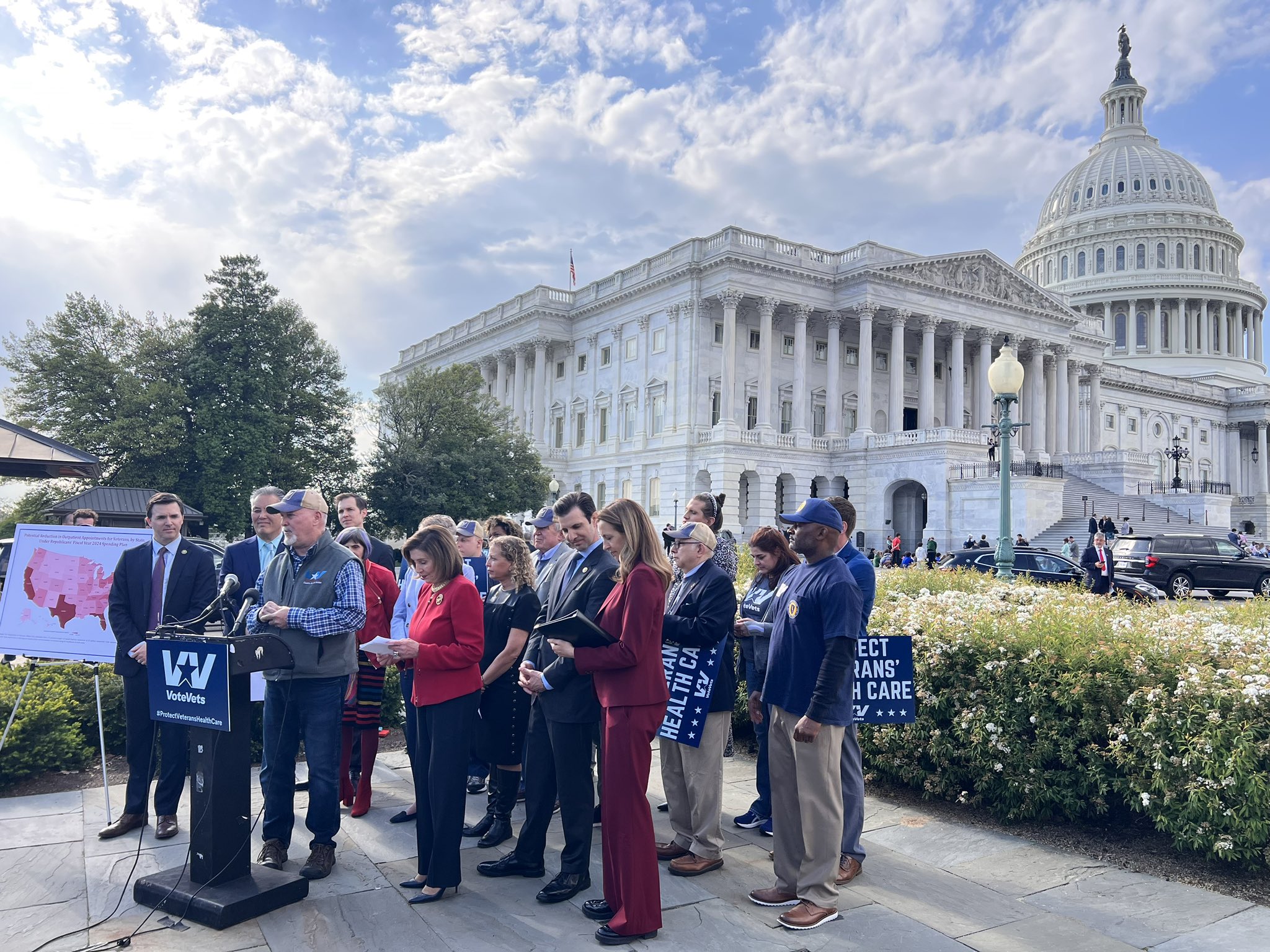Our Republican members of the United States House of Representatives offer up press releases and tweets every day of the year paying tribute to America’s servicemembers and veterans, stressing a country’s obligations and gratitude to the men and women who don the uniform in defense of the nation.
Those same Republican House members recently voted for a bill that would cut spending for the U.S. Department of Veterans Affairs by twenty-two percent the coming fiscal year. The hostage-taking scheme is a means of extracting destructive concessions in exchange for voting to raise the debt ceiling so the federal government can pay its bills for spending already approved.
“People who regularly read my newsletter know that I am not a partisan bomb-thrower, but the cuts proposed by my Republican colleagues would mean gutting law enforcement, food safety and vital support for working families across Washington state,” said Representative Derek Kilmer, D‑Washington, writing to constituents. Kilmer represents the 6th District in the House.
As the clock clicks down on debt obligations, we are waking up to the consequences of Republicans’ fiscal demands. Any evaluation goes beyond hyperbole, both in the stock market crash and loss of millions of jobs likely resulting from a default, but also for impacts of Republican-championed cuts on the state and federal services such as those provided by Veterans Affairs.
Budgets are big news and a big deal in other countries, anticipated and talked about in such countries as Canada and Great Britain. Governments stand and fall on their priorities. Here, the President’s budget proposal is briefly kissed off as unrealistic before we turn our attention to the latest scandals and multiple killings.
Budgets have consequences. Or as Representative Susan DelBene, D‑Washington, put it, “With each passing day, Republicans’ political games create more uncertainty for families and the global economy.” Translation, the House Republicans have set an enormous price on averting an enormous catastrophe.
I went over that “totally unacceptable” price on the phone with Mary Karzynski, director of government affairs for VoteVets.org, an organization of progressive veterans working for a better future for America. Of course, default has the potential to deny veterans’ benefits altogether. But the Republicans’ price to keep that from happening would mean cutting losing $2 billion from the American Rescue Plan and canceling $365 million in major construction projects.
The pricetag of proposed cuts to the Department of Veterans Affairs totals some $30 billion. Veterans would find themselves unable to schedule wellness visits, but also cancer appointments, mental health treatments, substance abuse treatments, and a multiplicity of VA services. The Veterans Benefit Administration would cut its staff by more than 6,000 people, worsening wait time by adding 1134,000 claims to the disability claims backlog.
“Don’t believe anyone who says these are draconian limits,” House Speaker Kevin McCarthy said not long ago, explaining that VA would continue to operate at 2022 levels. But as Seattle-based VoteVets organizer Rick Hegdahl (a former President of the Northwest Progressive Institute) points out, there are going to be more veterans and more health care demands. Congress has recently extended benefits to service members exposed to toxic smoke from burn pits here and abroad.

Similarly, consequences of proposed budget cuts run up and down the federal government, potentially punching more holes in an already-frayed social safety net. A member of the House Ways and Means Committee, DelBene recently compiled a list of painful cuts the Republican budget would inflict on the state of Washington State.
A total of 4,800 pre-school and child care slots would be eliminated. A whopping 182,000 Washingtonians would lose food assistance. We’d see 80,000 students see the cost of college go up. We’d have 17,000 Washington families feel an increase in housing costs. And 164,500 veterans could lose medical care.
A whopping 1.5 million seniors would have to wait at least two months longer for Social Security and Medicare assistance.
Joel Ryan, executive director of Washington State Head Start, explained what the Republicans’ attacks on essential public services would do to kids: “Head Start programs will be forced to slash enrollment, cut staff and dilute services just as the needs of our lowest income preschool children and their families have experienced disrupted learning during the COVID-19 pandemic.”
Such cuts are part of Republicans’ DNA, even as they lionize the military.
Some years back, the second Bush administration sought to close the VA’s Jonathan Wainwright Medical Center in Walla Walla. The shutdown was stopped after Senator Patty Murray and the local VFW post staged a raucous hearing. Veterans Administration brass heard vets explain how they would have to drive two hundred-plus miles to Seattle, Portland or Spokane for needed treatment.
All eight of this state’s Democratic House members voted against the Republicans’ “Default on America Act,” the name given to it by Democrats. The delegation’s two Republicans, Cathy McMorris Rodgers (CMR) and Dan Newhouse, cast Yea votes. As chair of the House Energy and Commerce Committee, McMorris Rodgers was also overseeing a Republican-sponsored energy bill through floor passage.
The energy plan extends generous federal subsidies to the oil and gas industry, already enjoying multi-billion-dollar profits. CMR has made it a touchstone to vote against the needs of constituents in her needy Eastern Washington district.
We need to pay more attention to budgets.

